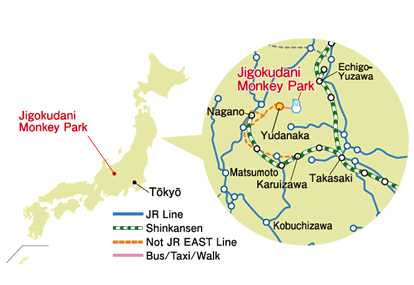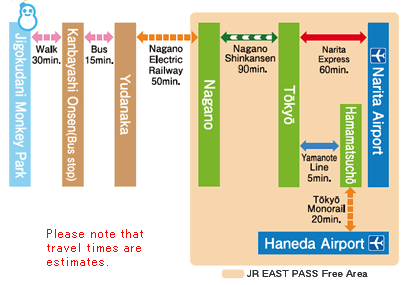Primate Watching
© Adam Hermans
Jigokudani Monkey Park, Japan
Seeing this Species
Jigokudani is the only spot in the world with an outdoor hot spring bath for the macaques. Particularly during winter between November and March, tourists swarm to this place to catch the humorous antics of macaques soaking in the onsens (hot springs) while partially covered in snow.
Jigokudani Monkey Park, Nagano Prefecture, Japan
Jigokudani means “Hell Valley”. It gets its name from the steep cliffs and steam coming off the springs. The Park can be reached from most major cities with the railway. From the Japan Rail Tokyo station, take the Nagano Shinkansen to Nagano station. Once there, switch to the Nagano Electric Railway where you take the Yudanaka line to Yudanaka station. A Nagano Electric bus for Kanbayashi will bring you to Kanbayashi Onsen bus stop. From here, it is a 30-min walk through a beautiful cedar forest into Jigokudani. More information on getting there from other major cities can be found at their Park website. Adult entrance fee is 500 yen (~$5).
Primatology
Taxonomy & Occurrence
Two subspecies are currently recognized: Japanese Macaque (M. f. fuscata) and Yakushima Macaque (M. f. yakui). While M. f. fuscata is widespread and can be found in three of the four main Japanese islands (Honshu, Shikoku, and Kyushu) and the smaller islands of Awaji, Shodo, Kinkazan (Miyagi Prefecture), Kojima (Miyazaki Prefecture), M. f. yakui is only found on the island of Yakushima (Kagoshima Prefecture). Japanese macaques are also known as the snow monkeys as they live in places where snow covers the ground for four months each year. No other non-human primate is more northern-living, nor lives in a colder climate.
IUCN Conservation Status
Least Concern
Even though the species is not at risk of extinction at the moment, over 10,000 individuals are killed each year to prevent agricultural damage [1], a situation which may require more careful management [2].

Jigokudani in relation to the capital, Tokyo


Entering Jigokudani
© Andie Ang
Getting to Jigokudani
Probability of success: ◆ ◆ ◆ ◆ ◆
Overlapping species: None
Other sites:
Fuji-Hakone-Izu National Park, Japan
Due to its proximity to Tokyo and the ease of transportation, it is the most visited national park in Japan.
Overlapping species: None
Local contacts:


Sharing Jigokudani with the human primate
© Andie Ang
Toasting in the hot springs of Jigokudani during winter
Photo by Alamy | © Zuma Press
References
[1] Abe H., Ishii N., Ito T., Kaneko Y., Maeda K., Miura S. & Yoneda M., 2005. A Guide to the Mammals of Japan. Tokai University Press, Kanagawa, Japan.
[2] Watanabe K. & Tokita K., 2008. Macaca fuscata. The IUCN Red List of Threatened Species. Version 2014.2. Downloaded on 21 August 2014.
Page Last Updated: 27 August 2014
